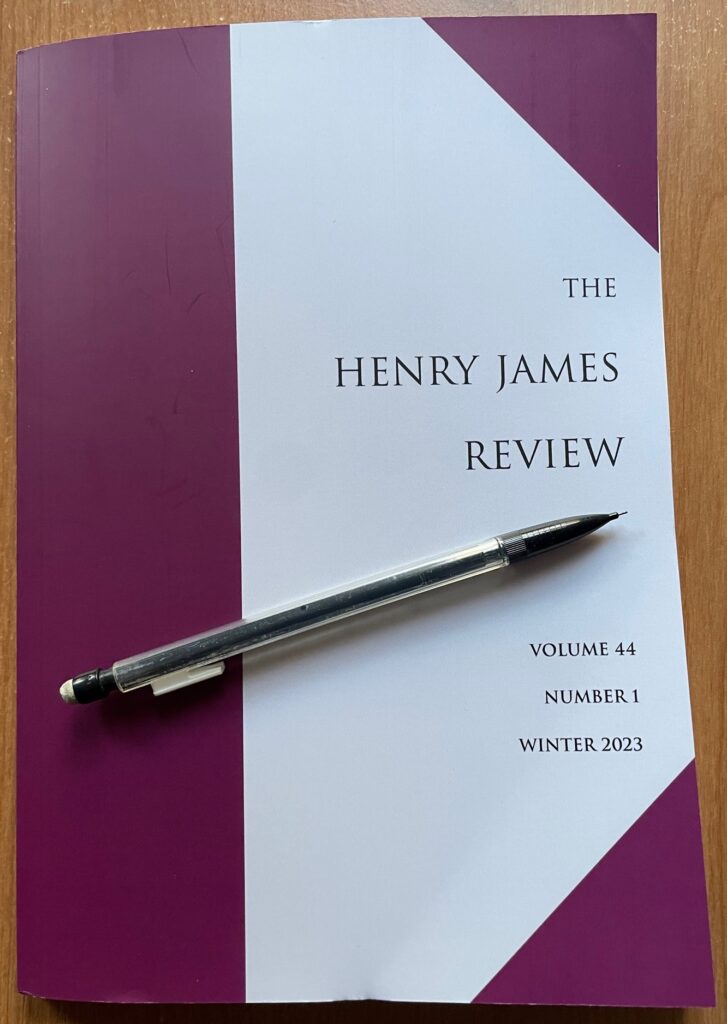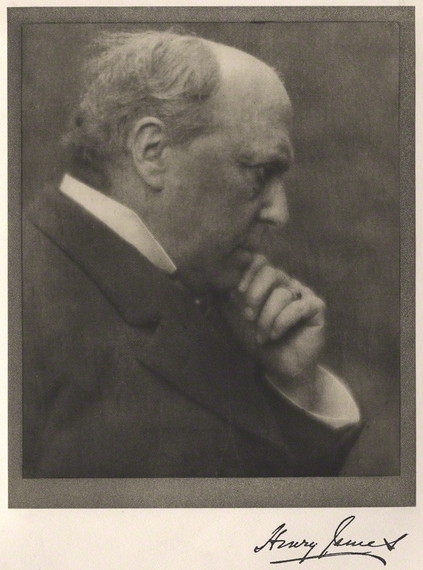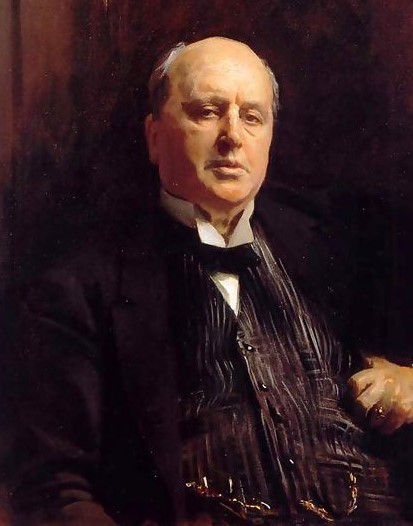
My article on “Punctuation” has been published in The Henry James Review!
“Punctuation and the Writer/Reader Relationship: Adding to Vernon Lee’s Consideration of The Ambassadors.”
The Henry James Review, Vol. 44, No. 1, winter 2023
I presented a lively rendition of this paper at the Vernon Lee: Aesthetics & Empathy Conference held at Churchill College, Cambridge, last October (2022), organized by Sally Blackburn-Daniels and Derek Matravers. If you would like a copy of the article, please send me a message in the Comment section below.
Henry James is easy to imitate–and parody! When I presented a paper at the Henry James Society Conference in Trieste, Italy, in July 2019 (in the middle of a heat wave!), I included a “quiz” to see if people could identify the Jamesian “Ventriloquists” by reading a paragraph or so from their work. See if you can figure out who’s who!
But first! Here’s a paragraph by Ernest Hemingway, from “A Moveable Feast” followed by one that I have re-written as Henry James might have written it—it was fun!

It was easy to get into the habit of stopping in at 27 rue de Fleurus late in the afternoon for the warmth and the great pictures and the conversation. Often Miss Stein would have no guests and she was always very friendly and for a long time she was affectionate. When I had come back from trips that I had made to the different political conferences or to the Near East or Germany for the Canadian paper and the news services that I worked for she wanted me to tell her about all the amusing details. There were funny parts always and she liked them and also what the Germans call gallows-humor stories. She wanted to know the gay part of how the world was going; never the real, never the bad. [133 words, one comma, one semi-colon]
————
One had felt comfortable in the very repetition of the act, as it were, of presenting one’s self at 27 rue de Fleurus, late in the dimming, golden light of succeeding afternoons that stretched endlessly into dusk, into autumn; presenting one’s self, to be sure, as a humble acolyte in the sanctuary of Art and, even more, of Conversation. At times—to me, the best of times—Madame S. would be enchantingly, curiously alone, and would endeavor, artlessly, quietly, to let me know that her friendliness to me was true, was natural, and—for a long time—affectionate. On those occasions when I “turned up” after having been engaged in my work—I wrote, you see, for “the papers,” on any number of subjects: German politics, Turkish customs, items for the public that were to become known as “human interest stories”—on those occasions, I say, when I visited her upon my returns, she would beg me for all the amusing details, especially the “funny parts” as she termed them; she liked best the stories that showed rather a sort of gallows-humor, but always with a light touch, a gay touch—never the actually bad, never the really real. [199 words, 29 commas, 2 semi-colons, 7 dashes]

The Jamesian Ventriloquists QUIZ
Henry James and the Jamesian Ventriloquists
Can you identify the authors?
These six excerpts are from works by Henry James and other authors who ‘sound’ like James. Here are five authors to choose from (yes, one is included twice): John Banville, Max Beerbohm, Henry James, James Thurber, Colm Toibin. Good luck! (The answers are at the very bottom, below the magnificent portrait of James by John Singer Sargent.)
—————– 1 ——————–
He waited a moment longer, then turned to her with a look rendered a little strange by the way it happened to reach over his glasses. It was even austerer than before. “Keep forgetting what?”
She gave after an instant, a faint, feeble smile which seemed to speak of helplessness and which, when at rare moments it played in her face, was expressive from her positive lack of personal, superficial diffidence. “Well—I don’t know.” It was as if appearances became at times so complicated that – so far as helping others to understand was concerned – she could only give.
——————- 2 ——————–
“I knew that you were in Italy,” she said. “I was told so by friends in Venice, but I did not know you were in Florence.”
He watched her as she settled herself into a wicker chair, having rearranged the cushions, talking all the while in her customary scatterbrained tone, which could deceive the unwary into believing that she was foolish…That she never seemed to listen to others and appeared to notice nothing save her immediate comfort was, he knew, a high pretense. She tended, in fact, to miss nothing.
—————— 3 ———————
It was early, and she thought at first the small dim
room was empty. How expectant the chairs and tables seemed, bedecked with
silver and crystal and linen and carefully arranged in ranks, like so many
dancers ready to plunge into a waltz and tensely awaiting the first crashing
chord from the orchestra. The maître d’
appeared—another frock-coat, another grey cravat plumped up like a pigeon’s
chest—and she was murmuringly led to a place in the corner and deftly seated,
although, despite the man’s soft obsequiousness of manner, she had momentarily
the sense of having been screwed down into her chair, like a cork forced into
the neck of a bottle.
———————- 4 ————————
He had in the fullest degree, now, the sense of being
cut adrift, and it was with all jubilant sail set that he made for, saluted,
and swept past his clearly astonished hostess. He was bound for, as by, it came
to him, a scanned and ordered chart, a paper signed and sealed, the woman in,
it had been his little wager, brown, the woman who, he had figured it for his
companion, out of the depths of a mysterious desolation, was somewhere all set
to pounce upon him. “Oh, not,” his companion had charmingly wailed, “in this,
of all seasons, brown.” He had not even turned it over. “The color,” he had
promptly assured her, “the certain, the unavoidable color of dilemma.” His
companion had, on this, fully taken in his apprehension; she had walked, as it
were, around and around it. “She may, of course,” his companion had finally
brought out for him, “be charming. I can see her, quite clearly, in the
quietest of blues. She might even, you know, beautifully listen.”
———————– 5 ————————
“…the others being out of earshot, he reminded me that I had promised him the night before in the smoking-room to give him to-day the knowledge I had then withheld. If I had announced that I was on the track of a discovery, pray had I made it yet, and what was it, at any rate, that I proposed to discover? I felt now, in truth, more uncomfortable than I had expected in being kept to my obligation, and I beat about the bush a little till, instead of meeting it, I was able to put the natural question: “What wonderful things was he just saying to you?”
“Oh, characteristic ones enough—whimsical, fanciful, funny. The things he says, you know.”
It was indeed a fresh view. “They strike you as characteristic?”
“Of the man himself and his type of mind? Surely. Don’t you? He talks to talk, but he’s really amusing.”
—————– 6 ——————-
It occurred to him as befitting her remoteness, which was a part of her magnificence, that her voice emerged somewhat muffled by the bedclothes. She was ever, indeed, the most telephonic of her sex. In talking to her you always had, as it were, your lips to the receiver. If you didn’t try to meet her fine eyes, it was that you simply couldn’t hope to: there were too many dark, too many buzzing and bewildering and all frankly not negotiable leagues in between. Snatches of other voices seemed often to intrude themselves in the parley; and your loyal effort not to overhear these was complicated by your fear of missing what she might be twittering. “Oh, you certainly haven’t, my dear, the trick of propinquity!” was a thrust she had once parried by saying that, in that case, he hadn’t—to which his unspoken rejoinder that she had caught her tone from the peevish young women at the Central seemed to him (if not perhaps in the last, certainly in the last but one, analysis) to lack finality. With her, he had found, it was always safest to “ring off.” It was with a certain sense of his rashness in the matter, therefore, that he now, with an air of feverishly “holding the line,” said “Oh, as to that!”
————————————–

- (James, The Awkward Age, p. 175, Ch. 17, Penguin Modern Classics)
- (Toibin, The Master, p. 228-29)
- (Banville, Mrs. Osmond, p. 10)
- (Thurber, “The Beast in the Dingle,” p. 128-129; NY, Harcourt Brace 1928)
- (James, The Sacred Fount, p. 59, New York/Charles Scribner’s Sons, 1901)
- (Beerbohm, “The Mote in the Middle Distance,” 1912)